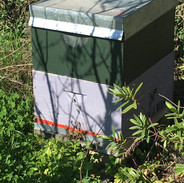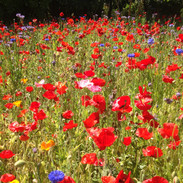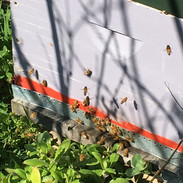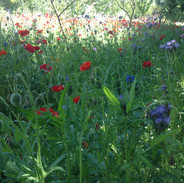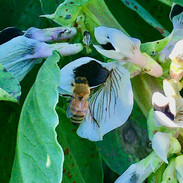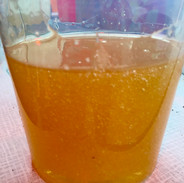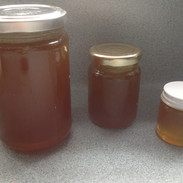
Bees in The Garden
Bees are amazing little creatures and we need them! They are probably the most important pollinators we have in the garden, the farms, the orchards etc. We are much dependant of the bees pollinating our food sources, so we need to do our bit and plant more flowers and to plant a varied variety of flowers and try and give them a food source all year round. Not only do the bees benefit but we do by having lovely flowers in our gardens. It does not have to be just flowers, herbs provide a good source of food to. So when your basil is going to seed, don’t pull it out leave it, the same with your vegetables, leave a couple of plants that have gone to seed so the bees can benefit. If you are really brave I’m not, you could even let clover and dandelions grow!
Pesticides are not good for us, the environment and especially the bees, so if you are not spray free/organic in your garden, please really give some thought as to whether you really need to use that spray! If you do need to spray, please try and make sure you use bee friendly pesticides and never spray when bees are out in your garden. The best time to spray is very early morning or late evening, when the bees are not around.
New Zealand has 28 species of native bees and 13 introduced species. They all need pollen and nectar to feed on as well as water. I often see our bees and other visiting bees in the shallows of our pond having a drink. The pollen the bees gather, give them necessary fats and proteins and the sugars in nectar it what the bees use to make honey. They need all of these to stay healthy and nourished. Honey bees are a colony is a family of individuals who are related to each other much dependant on each other for the survival of the colony. The colony is made up of the Queen bee (mother), Worker bees (daughters) and Drones (sons). Each member has a particular job to do within the colony. It’s an amazing existence built on working for the greater good!
We have a bee hive in the garden which we rent from www.kirweebees.co.nz Glynn and Alissa who run a great family business and are very passionate about bees. Renting it great as we reap the benefit of having the bees to do their bit to pollinate the vegetable garden and the fruit trees in the orchard and then we get jars of honey at the end of the season. Glynn comes round and checks the bees throughout the year, so we don’t have to worry about them, but we do need to make sure there is plenty for them to eat. Whilst we have a good flower garden I am going to make a concerted effort this year to have more flowers in the vegetable garden as I know last year was not a good year for bees or bee keepers. Having a hot summer makes it hard on the plants and therefore food supply for the bees becomes limited, so I will be working harder this year to provide for the bees!
Growing wild flowers, is great for the bees and you can now buy seeds easily from various suppliers throughout New Zealand. I sprinkle wild flower seed around our fruit trees in the orchard and also will be sowing some in the back of the vegetable garden where the beehive is so they have an immediate source and any where else in the garden I can. If everyone can set aside just a small patch it would definitely help. All you need to do is to clear the area of weeds and sprinkle the area with either seed raising mix, potting mix or compost before sowing the seeds. Then I give this a good water first as most wildflower seeds are tiny so by water the soil first they have something to stick to. Just sprinkle them lightly on the prepared soil and then either gently rake over or I use my hands just to mix in a bit. Don’t let the area dry out as the seeds need good moisture to germinate, but equally don’t flood them with water. Spring is the ideal time to sow as there are still usually showers to help with watering. At the end of the season you can either just mulch them or chop them down but leave them there as they will spread their seed and pop up next year!
Here is a list of some Bee friendly plants to have in the garden which will not only look good, but you can eat some! There are many more so, just start planting what ever you like and help the bees!
Vegetables -
Beans - All beans are great source of food - Brassicas - Cabbage, Broccoli, Cauliflower - Cucurbits - These are your Courgettes/Zucchini, Cucumber, Pumpkin, Squash, Melons
Herbs -
Bergamot - Bees love this, and its pretty and edible! - Borage - Chives - Lavender - Marjoram - Oregano - Rosemary - Thyme
Flowers -
Black Eyed Susan - Calendula - Cornflower - Cosmos -Cynoglossum - Californian Poppy - Gilia - Linum - Lobularia - Poppy - Phacelia
For further information about bees have a look at the Apiculture New Zealand website there is some great information to be found there www.apinz.org.nz

